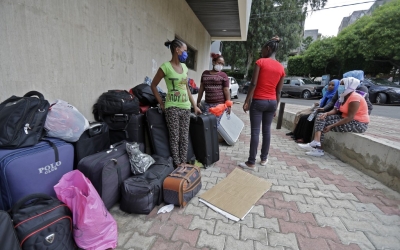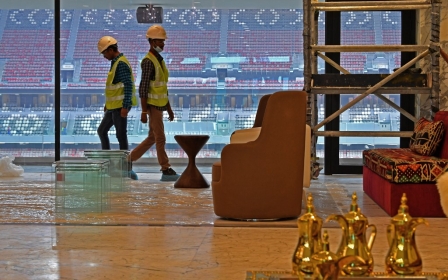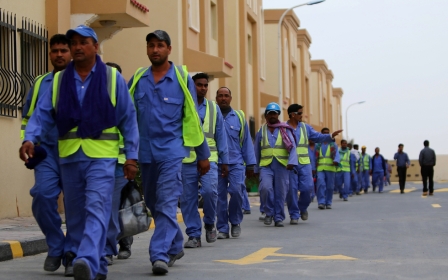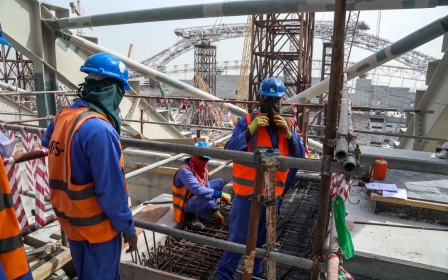Migrant workers in Qatar still facing wage abuses despite reforms: HRW
A report from Human Rights Watch (HRW) has found that reforms to protect migrant workers in Qatar have proven to be largely unsuccessful, as many still face withheld salaries and poor working conditions.
The report found that unpaid salaries and wage abuses are widespread across at least 60 employers and companies in Qatar.
Workers from a range of occupations, including cleaners, construction workers, servers and security guards have suffered from wage abuses, leaving them in destitute conditions.
Michael Page, the deputy Middle East and North Africa director at Human Rights Watch, said that the withholding of wages has left many in a state of fear of their employers.
“We have heard of workers starving due to delayed wages, indebted workers toiling in Qatar only to get underpaid wages, and workers trapped in abusive working conditions due to fear of retaliation," Page said.
The report has also found that Qatar has failed to meet its commitment to the International Labour Organisation (ILO), which it made in 2017 to protect workers from wage abuses and the abolition of the kafala system.
The kafala system ties a worker's visa to their employers, leaving them dependent on their employer for residency in the country, often putting them in a vulnerable position.
The kafala system has left many in a climate of fear, where they are unable to voice their concerns due to retaliation from employers. Meanwhile, many have fallen into debt in order to survive due to withheld or delayed wages.
According to the findings in the Human Rights Watch report, in which 93 migrant workers were interviewed, employers are still responsible for securing, renewing and cancelling residency permits for migrant workers.
'Drowning in debt'
A migrant worker from Kenya told HRW that he has been overworked, underpaid and left with the choice of either sticking it out, or returning to Kenya drowning in debt, adding that most of the reforms have not materialised.
“The government talks about reforming labour laws but most of it feels like it is only on paper. People on the ground are really suffering and rogue employers are getting away with gross injustices” he said in an interview, requesting anonymity for his protection.
“The country is one of the richest in the world, but it was built and continues to run on the fuel of its migrants. The exploitation and oppression have taken a mental and physical toll on us…”
The worker also explained that overtime hours are often ignored, and food allowances are not given during periods where wages are delayed.
“My March salary arrived in June, April’s salary came in July. I have not been paid for May, June, and July. For every day that my wages are delayed, I go deeper into debt, because I send 1,000 Qatari Riyals ($275) a month home and have no choice but to borrow money for food,” he told HRW.
According to the report, 59 instances of delayed or unpaid wages were recorded and 13 instances of contract substitution were found.
Contract substitution is where workers sign contracts that promise a certain salary, but upon arrival in Qatar, are met with a new contract with a lower salary.
Last month, the United Nations raised “serious concerns” about structural racism towards migrant workers in Qatar, particularly focusing on those of South Asian and sub-Saharan African origin.
Qatar’s Government Communications Office (GCO) released a statement in response to the HRW report, claiming that it contains inaccuracies and does not reflect the current situation in Qatar.
The statement reiterates that ‘nearly all individuals who come to Qatar for employment never experience any form of wage abuse’ and that there are ‘few isolated, instances where workers experience this issue’.
HRW found several cases of underpayment, and found that wage abuses have worsened since Covid-19, with many employers using the pandemic as an excuse to withhold wages.
Migrant workers make up around 95 percent of the total labour force in Qatar, many of whom are working on the construction of the stadiums, hotels and services for the FIFA World Cup, set to take place in 2022.
Migrant workers are currently banned under Qatari law from joining unions and taking part in strikes.
Middle East Eye delivers independent and unrivalled coverage and analysis of the Middle East, North Africa and beyond. To learn more about republishing this content and the associated fees, please fill out this form. More about MEE can be found here.





